Editorial
Easing casino rules

There were reports last week that rules relating to the operation of casinos in Sri Lanka are being broadened in an effort to attract international players into the country. This is something that our beleaguered tourism industry will welcome. The availability of gaming opportunities is a visitor draw, as has been proved at many global destinations and even here during an earlier period. But governments have been ambivalent in their approach to the issue with moral and commercial dimensions opposing each other. As readers are very well aware, there are two established casino businesses already in operation in the country, one of them owned by the politically influential tycoon, Dhammika Perera who earlier this year was appointed to parliament on the SLPP National List replacing former Finance Minister Basil Rajapaksa. He was soon thereafter appointed a cabinet minister.
Perera, amid the convulsions caused by the Aragalaya that led to both the departure of Prime Minister Mahinda Rajapaksa and President Gotabaya Rajapaksa, since resigned his portfolio of Investment Promotion. To accept first parliamentary membership and then cabinet office, he quit the chair and board positions in a string of quoted and unquoted companies, including the Hayleys conglomerate, he controls. Whether he will return to the cabinet where more vacancies are due to be filled in the short term is yet an open question. Given speculation at the time he quit the cabinet that he may also vacate his parliamentary seat and whether he would wish to continue the political journey he embarked on remains to be seen. Long considered a Rajapaksa afficionado he, while continuing his business interests, unusually held the position of Secretary to the Ministry of Transport during the Mahinda Rajapaksa presidential tenure.
Older readers would remember a time when horse racing was conducted in Colombo, Boossa (near Galle) and Nuwara Eliya on a scale far grander than what prevails today with only the Nuwara Eliya race course remaining. But following the election of the SWRD Bandaranaike government in 1956, a ban on the import of race horses and gambling was imposed. This was welcomed, particularly by housewives with gambling addicted husbands flocking to the Colombo racecourse on Saturday afternoons and gambling away their pay packets.
Although horse races were not run here thereafter, the bookies developed a lucrative business accepting bets on the English races. This business thrived despite a ban on the publication of racing news that the mainstream newspapers complied with. But illegal race sheets on British races were freely available and no serious effort made to control the industry that thrives to date. The once grand Colombo race course occupying a vast acreage of prime city land was allowed to run down until then Defence Secretary Gotabaya Rajapaksa, wearing a second hat as Secretary Urban Development, beautified and commercialized the valuable resource.
Some Colombo five-star hotels were also permitted to run casinos some years ago in a short-lived experiment at a time when the hotel industry was gasping for survival during the war years. More recently the Australian gambling Moghul James Packer wanted to set up here and the ambivalence of the government’s attitude to gambling in the context of lobbies for and against was very visible. This was demonstrated by President Premadasa’s order to peremptorily deport Joe Sim, active in the then casino industry. Even the JKH-controlled Cinnamon Life project, probably the country’s biggest urban development investment ever, had space for gambling in its original design though the developer himself had no plans to enter the industry. It merely wished to let out space to an operator and it was whispered at the time that the pinnacle of government had expressed its preferences on who should get that space.
Now that a gazette has been issued to legalize and regulate casinos, opening the doors for the entry of global operators effective from Sept. 1, a reversal of the president’s previous outlook, it clearly seems that government has chartered a pragmatic course. Moral objections will obviously arise and there will be questions on how effective the regulatory mechanism will be. Political forces will inevitably mount the bandwagon and whether the administration will hold its ground remains an open question. At one point of time, Sri Lankans were supposed to be not permitted in casinos that ostensibly were exclusively reserved for foreigners. But that was not strictly enforced.
The availability of sexual services in and around casinos was widely rumoured and many ladies of allegedly easy virtue from Eastern Europe, former Soviet Republics and elsewhere were common sights in casino neighbourhoods. The new regulations have taken notice of this factor but how effectively it can be controlled remains to be seen. There is also the question of whether casino operators are paying proper taxes.
Macau, for example and more recently Singapore have done very well with casinos. Most Lankans will not wish this country to be a gambling dependent Macau but Singapore has for long been regarded here as an iconic model of development and good governance. It would be freely admitted that the way Singapore is run and how we run our affairs are chalk and cheese. Thus, even a shadow of the efficiency with which regulatory affairs are conducted there will not be possible here.
We cannot also forget that narcotic drugs first significantly entered this country with hippy tourists in the sixties and seventies. Links between organized crime and industries such as drugs, illicit liquor and gambling are easily developed. We already have serious drug and illicit liquor problems. But our tourism industry in which billions of rupees have been invested and a significant proportion of the work force depends on for a living needs all possible support; and so also the revenue-strapped treasury coffers.
Editorial
Good riddance!

Friday 27th December, 2024
A cascade of tectonic shifts triggered by the 2022 uprising or Aragalaya during the Gotabaya Rajapaksa government has reshaped Sri Lanka’s politics in such a way that more than 6,000 politicians have so far gone out of circulation, according to an election monitoring outfit. Executive Director of PAFFREL (People’s Action for Free and Fair Elections) Rohana Hettiarachchi has reportedly said those politicians were left with no alternative but to call it quits because they knew that they had absolutely no chance of re-election.
Among them are some prominent figures including political party leaders. This is not something the public bargained for. Those politicians were expected to remain active in politics until they went the way of all flesh. The news of their mass exit from politics must have gladdened many a heart, but the problem is that in this country the political flotsam and jetsam swept away by occasional giant waves like the one we witnessed last month are washed back ashore after drifting for years. There is also no guarantee that the newcomers to politics will be any better.
We have seen mountains in labour groan but deliver mice on several occasions during the past several decades. The current dispensation, which promised a revolutionary change in every sphere, has chosen to maintain the status quo; what we see on the economic front is a continuation of the policies and programmes of the previous regime to all intents and purposes. The JVP-led NPP made a solemn pledge to solve the problem of rice market manipulations, with a single stroke of the presidential pen.
But a cartel of millers continues to exploit farmers and consumers alike, and the government has opted for a shameful capitulation; it has restored to rice imports, which it vehemently condemned previous administrations for. The President’s pen has apparently run out of ink! There is hardly any difference between the new government’s foreign policy and that of the previous administration.
The Gotabaya Rajapaksa government was in the grip of a coterie of self-styled intellectuals, who banded together to form ‘Viyathmaga’, and grabbed key positions in the state sector following the SLPP’s electoral victories. They ruined that regime. The current administration is also swayed by a me-too version of ‘Viyathmaga’, and some of its members have been exposed for flaunting fake doctorates! Above all, it’s all hat and no cattle where the NPP’s promise ‘to catch thieves’ is concerned.
What has unfolded so far under the current administration is like a replay of the early stages of the Yahapalana and SLPP governments. It is hoped that the new leaders will care to bring about the revolutionary change they promised before the presidential and parliamentary polls so that their rule will not end up being something like a remake of an old movie or stage play with a new cast.
“Pity the land that needs a hero”, Brecht has famously said. Since Independence, Sri Lanka has been looking for heroes, fallen for the wiles of numerous bogus messiahs and seen many false dawns. Even a shaman succeeded in making a killing by selling an untested herby syrup, called Dhammika peniya, which was touted as a cure for Covid-19; he even duped some political leaders into swallowing it.
The news about the riddance of 6,000 politicians reminds us of an Aesopian fable, where a fox has one of its legs stuck in a rock crevice in a shallow stream. Having struggled to free itself but in vain, the poor creature is lying exhausted and covered with ticks when a small animal which happens to pass by offers to remove the ticks as it is not strong enough to do anything else.
The fox says the parasites had better be left untouched because they are already bloated and therefore cannot suck anymore blood, and if they are removed another colony of ticks will descend on it and bleed it dry.
Sri Lanka has been in the same predicament as the aforesaid fox all these years; successive governments have drained its Treasury dry with reckless spending and corruption. One can only hope that the new dispensation will be different. Hope is said to spring eternal.
Editorial
‘Swindlers List’

Thursday 26th December, 2024
Power not only corrupts but also makes the wielders thereof cherish the delusion that popular mandates are cartes blanches for them to do as they please and be above the law. This fact has been borne out by the despicable manner in which the President’s Fund has been misused, if not abused, under successive governments.
Thankfully, the President’s Fund is now under the microscope, and numerous questionable fund allocations have already come to light. It has been revealed that the Executive Presidents during previous dispensations arbitrarily allocated money from the President’s Fund to their kith and kin at the expense of the needy on the waiting list.
The JVP-led NPP government has released a list of politicians who have obtained money from the President’s Fund over the years in violation of the terms and conditions governing the provision of relief therefrom. All of them have obtained huge sums of money by leveraging their political connections, and those shameless characters include a tainted politician who fell off an upper-floor balcony of a hotel down under, over a decade ago, while trying to enter an adjoining room a la Spider-Man; he eventually got entangled in a web of lies of his own making.
Embroiled in an academic credentials scandal and unable to make good on its election promises and solve burning issues such as the shortages of rice and coconut and the soaring prices of essentials, the NPP government is all out to divert attention from its failure by carrying out propaganda attacks on the Opposition, which is on the offensive. However, the release of the Swindlers List, as it were, and the police probe into the misuse of the President Fund are most welcome. This has been an unintended benefit of the ongoing propaganda battle between the government and the Opposition.
As for financial assistance from the President’s Fund for patients, one of the conditions stipulated by law is that the family of the patient seeking relief is without adequate financial resources to meet the cost of surgery/treatment. It has also been specified that the monthly income of the family including the patient, spouse and unmarried children should not exceed Rs. 200,000, and a Divisional Secretary should recommend that the person concerned is eligible for financial assistance.
The President’s Fund relief scheme for patients was launched to provide financial assistance to low-income individuals who lack the means to bear the costs of medical treatment or surgery. It is therefore wrong for the President and/or the governing board of the Presidential Fund to grant funds to those who have the wherewithal to afford treatment or surgery either in this country or overseas.
Obviously, politicians who spend colossal amounts of money on their election campaigns and live the high life, residing in palatial houses, moving about in super-luxury vehicles, and travelling the world, are not eligible for financial assistance from the President’s Fund.
The CID is reported to have been called in to investigate the misuse/abuse of the President’s Fund. One cannot but agree with the incumbent government on this score although it is driven by an ulterior motive. One can only hope that the ongoing investigation will reach a successful conclusion, and legal action will be instituted against all those who are responsible for the misappropriation of state funds.
The Swindlers List submitted by the NPP government to Parliament is incomplete; it contains only the names of Opposition politicians. The public has a right to know how all Presidents have misused/abused the President’s Fund since 1978. Are there any individuals connected to the JVP or the NPP among those who have received financial assistance from the President Fund fraudulently, as claimed by Opposition MP Dayasiri Jayasekera, one of those exposed by the government?
Let Minister and Cabinet Spokesman Dr. Nalinda Jayatissa be urged to make public a complete list of beneficiaries of assistance from the President’s Fund instead of releasing names selectively to settle political scores. The NPP government, which is full of self-righteous members, should be able to do so if it has nothing to hide. It is hoped that the Opposition MPs who have not abused their political connections to obtain assistance from the President’s Fund will crank up pressure on the government to do so.
Editorial
Of that half-open can of worms

Wednesday 25th December, 2024
The CID has once again proved its selective efficiency and adeptness at doing political work. No sooner had it received a complaint from Justice Minister Harshana Nanayakkara that someone had sought to discredit him by having the title, ‘Dr’, placed before his name on the parliamentary website than it launched an investigation, interrogated the parliament staff and recorded statements, but its probe has apparently come up against a brick wall.
Parliament workers have reportedly informed the CID that the titles given to the NPP MPs on the House website are based on information contained in a letter sent by the office of the Leader of the House, Bimal Ratnayake. What is described as an image of the letter in question is doing the rounds in the digital realm. The government has chosen to remain silent on the letter and the progress in the CID probe, which is bound to open a can of worms for it.
What will the CID do now? Will it grill the staff of the Leader of the House as well? It will be interesting to see what the government’s reaction is. Will the Justice Minister, who thinks there has been a sinister campaign against him, urge the CID to go the whole hog and get to the bottom of it?
Strangely, an official of the Parliament Communication Department apologised to Minister Nanayakkara for what he called an inadvertent data entry error which had led to the placement of ‘Dr’ before Nanayakkara’s name. He issued a statement to that effect when the Opposition raised questions about the academic credentials of the NPP MPs. He owes an explanation to the public.
Minister Nanayakkara, after lodging his complaint with the CID, told the media that he suspected that there was a conspiracy to tarnish his image. Implying the involvement of his political opponents in ‘the conspiracy’, he went on to claim that ‘the dog’ (read the previous dispensation) had been got rid of but there were some ‘fleas’ left, and they too would be dealt with appropriately. He also expressed concern about what he called a counterrevolution.
The Justice Minister has caused a great injustice to man’s best friend. The NPP won elections by condemning the members of the previous government as a bunch of crooks who deserved to be behind bars for their many crimes; they included a politician who lined his pockets at the expense of cancer patients. Now, the Justice Minister likens those characters to canines!
The mention of ‘counterrevolution’ must have sent a chill down the spines of those who are au fait with world history, especially the brutal manner in which some self-proclaimed socialist regimes dealt with ‘counterrevolutionaries’; they resorted to witch-hunts and kangaroo trials which led to the elimination of dissenters. This country is no stranger to savage political violence.
Going by the aforesaid leaked letter, a wag asks whether the office of the Leader of the House has become the cradle of the ‘counterrevolution’ and home to the ‘fleas’ that have left the ‘dog’ in flight.
It defies comprehension why Minister Nanayakkara made a beeline for the CID over the doctorate issue. He should have taken it up with the Speaker and the Secretary General of Parliament and asked for remedial action. That is the proper procedure. Unfortunately, aspersions are now being cast on certain parliament officials.
The NPP parliamentary group has some members who served in previous parliaments and therefore are familiar with parliamentary affairs, and it is incumbent upon them to guide their junior colleagues.
-

 Sports5 days ago
Sports5 days agoPathirana set to sling his way into Kiwi hearts
-
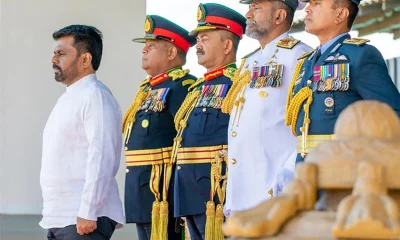
 News3 days ago
News3 days agoOffice of CDS likely to be scrapped; top defence changes on the cards
-
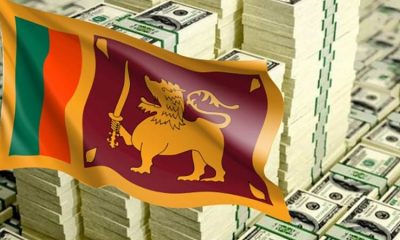
 News6 days ago
News6 days agoSL issues USD 10.4 bn macro-linked bonds
-

 Editorial6 days ago
Editorial6 days agoRanil’s advice
-

 Editorial5 days ago
Editorial5 days agoThe games they play
-
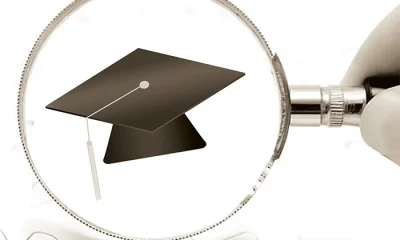
 Features3 days ago
Features3 days agoAn Absurd play in Parliament: Qualifications versus education
-
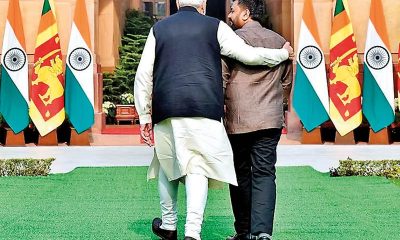
 Features5 days ago
Features5 days agoThe Government’s Term Tests & Results: The Good, the Bad and the Ugly
-
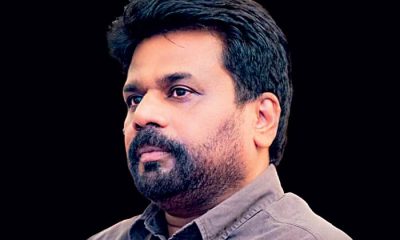
 Opinion4 days ago
Opinion4 days agoWhat AKD and NPP should bear in mind











